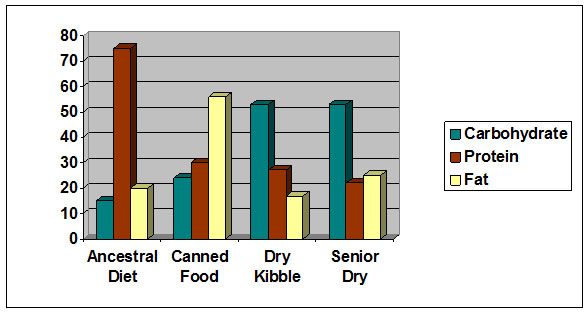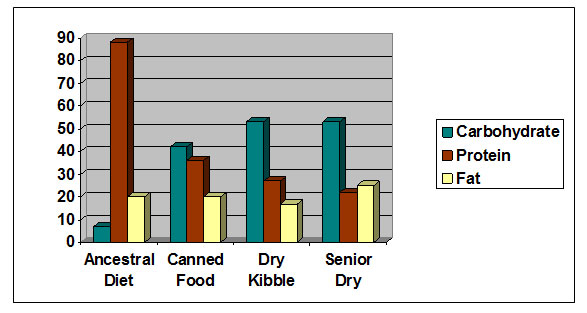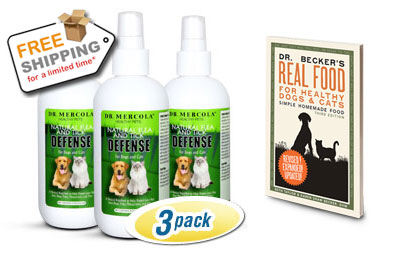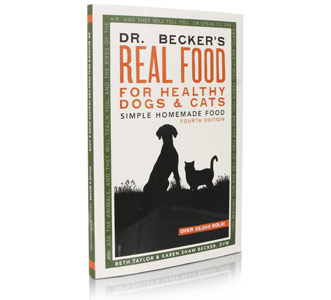"The Big Business of Pet Food Corporate Profits are Soaring… But How About Your Pet? Could Their Diet Be Causing More Harm Than Good?"
Sadly for your pets, the pet food industry is rapidly becoming Big Business.
Big Business to the tune of $15 billion worldwide.
Behind closed doors, strategic acquisitions of smaller companies are quietly taking place – clearly to capitalize on the tremendous profits the pet food industry offers.
What most pet owners don't realize is that the pet food industry is actually an extension of the food and agricultural industries.
Pet food provides these giant multinational corporations a very convenient and very profitable "built-in" market for wastes left over from their human food production.
But here's the problem… Your beloved pet was never designed to eat 'wastes'.
Today's commercial pet food is a far cry from your dog's or cat's ancestral diet – the diet their species has thrived upon for thousands of years.
Do You Know What's in Your Pet's Food?
Hello, this is Dr. Karen Becker. As a licensed Doctor of Veterinary Medicine, I'm pleased to have joined forces with Dr. Mercola to help educate readers about natural animal health.
It's become my personal mission to help support pet owners like yourself in making smart choices for feeding your pets.
Just as with humans, your pet's diet largely determines his or her overall health. Considering today's choices for feeding your pet, I'm more concerned than ever for your pet's health and their ancestral need for a natural, balanced diet.
With Big Business' marketing machine, it has become increasingly difficult to determine what's in that bag or can of pet food.
When the label says 'chicken', do you know exactly what part(s) of the chicken you're getting?
How about 'real meat'?
What's more, the 'Guaranteed Analysis' printed on every package is meaningless unless you're willing to do the required calculations.
Here's the real truth about your pet's diet: Unless you prepare your pet's food yourself, you really don't know for sure what's in it.
Who's Minding the Store?
Who actually determines what goes into your pet's bowl of food?
- The Association of American Feed Control Officials (AAFCO) establishes labeling requirements and "nutrient profiles" for pet food manufacturers.
- The National Research Council of the Academy of Sciences (NRC) provides nutritional standards for AAFCO.
When you see on the label of your pet's food "formulated to meet the nutritional levels established by the AAFCO nutrient profiles", you know the manufacturer used these profiles to formulate their products.
However, when it comes to enforcing and ensuring safe and healthy food for your pet, I'm sorry to report that regulation and enforcement varies widely from state to state.
The only entities actually enforcing pet food quality are state feed control officials. In some states, they may run basic tests to ensure the "Guaranteed Analysis" of the food. In other states, they don't even test.
What is the Meat in Your Pet's Food?
I feel it's important for you to know the truth about the meat in your pet's food, whether you buy it from the supermarket or a specialty "natural" pet food store.
Protein in your pet's food comes in various forms – meat, poultry or fish, meat or poultry meal, and meat by-products.
In the food industry, only about 50 percent of every animal can be used as food for human consumption.
The remaining parts, or "by-products" – heads, feet, bones, feathers, blood, intestines, organs, fat scraps, even unborn fetuses – are used in pet food and animal feed.
The Pet Food Institute – the trade association of pet food manufacturers – acknowledges the use of by-products in pet foods. To quote them directly:
"The growth of the pet food industry not only provided pet owners with better food for their pets, but also created profitable additional markets
for American farm products and for the byproducts of the meat packing, poultry, and other food industries which prepare food for human consumption."
Commonly you'll find meat meals in pet foods, including poultry meal, by-product meals, and meat-and-bone meal. 'Meal' signifies that these ingredients are not fresh; they are "rendered".
Rendering is the process where various ingredients are emptied into a large vat and boiled for several hours. These high temperatures can damage proteins and destroy natural enzymes.
From a health standpoint, denatured proteins from high processing temperatures can lead to food allergies and intolerances and inflammatory bowel disease.
But here's what's so controversial: In addition to food animal scraps, rendering, by law, can include grocery store expired meat (Styrofoam wrapping intact), road kill, diseased and disabled (and dead) cattle, and even euthanized pets.
Pet food companies claim they no longer process dead dogs and cats (insiders admit they previously did), but the FDA has found pentobarbital, the most common euthanasia drug, in rendered meat-and-bone meal and animal fat.
If your pet food label states one or more named meats such as "chicken" or "lamb", they are not by-products. However, they are still mostly leftover scraps and bones. "Chicken" consists of backs, spines and ribs, with minimal meat left on the bones. And yes, bones can count as protein!
Unless the label on your pet's food states that the food is "safe for human consumption", you can bet the protein source is less-than-optimal.
What Does Your Pet Need for Healthy Survival?
By nature, both cats and dogs are carnivores and predators.
And if you consider a dog or cat's anatomy, you'll quickly realize they were not designed for today's fabricated diets.
Over countless generations, wolves and wild dogs ate prey – including their meat, bones, and stomach contents. They scavenged for other tidbits such as eggs, ripe fruit, and insects.
Cats, given the chance, still delight in their instinctive cravings for birds and mice. Equipped with teeth that grab and puncture, they lack the ability to grind up the most common cat food – dry kibble.
As reflected by their ancestral diets, both cats and dogs require high levels of quality protein to truly thrive.
And considering there's a mere 0.2% difference between your dog's DNA sequence and that of the Gray Wolf, your pet's nutritional needs have not changed significantly either.
Protein is an important part of every cell. Essential amino acids from quality protein build healthy cells, organs, muscle tissue, enzymes, and hormones.
Protein is especially critical for puppies and kittens for growth and for mature animals for maintenance and repair.
Fat provides energy, essential vitamins and fatty acids. Ideally from natural animal sources, fatty acids are important for healing, reproduction, normal cell membrane synthesis, and a healthy coat and skin.
Cats' and dogs' natural ancestral diets are full of high-quality protein, animal-sourced fatty acids, fiber, nutrients and variety – a far cry from today's processed pet foods.
In today's commercial pet foods, gluten meals – mostly cheap corn gluten – are frequently used to boost protein percentages to meet AAFCO nutrient profiles.
These low-quality vegetable proteins replace more expensive meat-source ingredients.
Wheat gluten is used to create those consumer - appealing "chunks" and "bites" in canned and dry pet foods.
What Your Pets Don't Need That Actually May Cause Harm
Dogs and cats both have a nutritional need for meat, bones, and vegetables.
They do not have a need for carbohydrates or grains. In fact, in the ancestral diet, grains and seeds were not consumed unless they were pre-digested by their prey.
Carnivores, as opposed to herbivores (such as cows), have relatively short, simple gastrointestinal tracts.
Unable to make their own, they require all the essential amino acids – the building blocks of protein – from their foods. Plants and starches don't supply a full healthy array of amino acids.
But there's more. Our pets' bodies are just not designed to cope with large quantities of carbohydrates.
Your pet's pancreas is unable to secrete the enzyme needed to split cellulose into glucose molecules. Dogs' and cats' bodies just aren't efficient at digesting, assimilating and utilizing plant material and grains as high quality protein.
Unfortunately, feeding this type of unnatural diet can cause chronic inflammation and illness, obesity and other metabolic consequences.
Commercial pet foods – especially dry kibble – are loaded with carbohydrates. You'll commonly find rice, corn, barley, potatoes, and starch added to cat and dog food as cheap sources of energy and calories.
In fact, it's not unusual to find kibble with over 50 percent carbohydrate content.
And here's another thing… Corn is one of the most frequently genetically modified 'foods'. Not healthy for you… and not healthy for your precious pet.
In the two charts that follow, you can see how the traditional ancestral diet – the true nutritional needs of your dog or cat – compares with the nutrient profiles of today's common dry kibble and canned diets.
Calorie Distribution of Diets for Dogs

Calorie Distribution of Diets for Cats

Your Pet Wolfs Down This 'Food'… But Why?
You'd think with all these fillers and fabricated ingredients your pet would walk way from his or her dish.
Not so.
Pet food companies make it their business to ensure they don't.
To make the taste pleasing to pets, manufacturers spray the kibble and pellets with flavor enhancers (frequently from by-product "animal digests") added to non-human grade rendered animal fat or vegetable oils.
Their scientists have discovered that dogs and cats love the taste of this 'flavored fat spray'.
In addition to the flavor enhancers, pet food manufacturers add many other chemicals as well.
As the intense processing and extreme temperatures mostly destroy any nutrients that might have been present naturally, manufacturers must add vitamins and minerals to the food.
Other additives to your pet's food might include:
- Emulsifiers to bind fat and water
- Synthetic antioxidants to keep fat from turning rancid
- Artificial flavors and colors to improve appearance
- Toxic preservatives such as propylene glycol (in dog food), BHA, BHT, and ethoxyquin to guarantee a 12-month shelf life
- Pelleting agents and binders
- Grinding, drying, and curing agents
- Petroleum derivatives and texturizers
- Seasonings, spices, and sweeteners to improve taste
Think about it. Do you really want your family pet ingesting all these additives day in and day out?
Your Pet's Safety May Also Be at Risk
As you're aware, the pet food industry has not had a very good track record for safety. Recalls have become increasingly common.
The largest, and most lethal recall (so far), began in March of 2007. Menu Foods recalled more than one hundred brands of food, including Hill's Science Diet, Iams, Eukanuba, Purina Mighty Dog, and store brands from Wal-Mart and others.
Over 17,000 reports of sickness were received by the FDA and about 20 percent of these cats and dogs died from acute renal failure.
The cause?
Scientists discovered high levels of melamine – a chemical used in fertilizers and plastics – in wheat gluten and rice protein concentrate imported from China. Another harmful chemical, cyanuric acid, was found in the food as well.
Melamine was deceptively added to artificially boost the protein content of the food.
What's more, melamine-tainted ingredients were added to the feed for cows, pigs, and chickens.
As I said earlier, unless you prepare your pet's food yourself, you really don't know for sure what's in it.
There simply are no guarantees for your pet's safety or nutritional well-being.
What Can You Do to Improve Your Pet's Diet?
Of course you care about what you feed your pet. After all, she or he is an important – and loving – member of your family, right?
There are several things you can do right away to improve the quality of the diet you feed your cat or dog…
- Call your pet food manufacturer and ask if your pet's food is "safe for human consumption". That's a big clue to quality.
- Wean your pet off less-healthy dry kibble and replace with canned, wet food. It's a better option.
- Check out commercial fresh frozen diets that mimic the ancestral diet.
- Consider preparing your own pet food with wholesome, fresh ingredients.
What Are the Advantages of Preparing Your Pet's Food?
There are so many advantages to preparing your pet's food yourself. Here are what I consider the top three:
- You have total control over what goes into your pet's food.
- You can save money by buying larger quantities of fresh food on sale.
- You can provide fresh, "living foods" for unsurpassed vibrant health.
While preparing your pet's food yourself is the healthiest way to go, there are a couple of caveats you need to be aware of.
Why Your Vet May Advise Against a Homemade Diet
I'll be blunt. Many veterinarians advise not to feed a homemade diet to your pets.
Why?
Simply because most pet owners – obviously with the best intentions at heart – do a poor job of preparing a well balanced, species-specific diet for their dog or cat.
Veterinarians, myself included, have witnessed far too many casualties resulting from pet owners' good intentions.
I have seen severe nutritional deficiencies, disease, and even irreversible organ damage due to unbalanced homemade diets.
Here's the thing…
Just because you toss together meat and a vegetable or two – or even worse – random leftover table scraps or a raw chicken wing, you do NOT have an appropriately balanced diet!
You truly can cause more harm than good to your beloved pet if you don't know what you're doing. It's heartbreaking, but true, to know you can bring about disease in your pet by feeding an unbalanced homemade diet.
Even though your pet may look healthy from the homemade diet you're feeding, nutritional deficiencies can easily go undetected in the beginning. Within two or three years, deficiencies can lead to major cardiovascular and organ changes.
Sometimes unfortunate consequences can occur much sooner. For example, a cat fed a taurine deficient diet can succumb to fatal cardiomyopathy in less than a year.
All it takes to cause harm is to leave out one essential nutrient.
'Real Food for Healthy Dogs and Cats' – The Healthy Solution
What I have seen firsthand in my practice and what I continue to observe in conversing with my readers has motivated me to take action.
I've recognized that there is simply not enough accurate information out there to help pet owners like yourself prepare a nutritionally balanced, species-specific homemade diet.
In response, I have written a book to give you the tools you need to provide your cat or dog the nutrition their bodies require – and the foods they instinctively crave.
Just as important for you, you'll finally have the peace of mind knowing you're doing it right. For the sake of your beloved family member.
No guesswork. No improvising. The pathway to feeding your dog or cat the healthiest diet possible is clearly laid out for you in my Real Food for Healthy Dogs and Cats.
Based on the ancestral diets of dogs and cats, this book provides a rotational feeding plan and recipes for a meat-based diet that includes appropriate levels of vegetables, fruits, and supplements to complete the diet, analyzed to ensure nutritional needs.
The recipes in Dr. Becker's Real Food for Healthy Dogs and Cats meet the nutritional guidelines of:
- AAFCO
- NRC
- The Ancestral diet for your dog or cat.
You know you're providing them with the nutrition they need for energy and vibrant health.
Help protect your precious pet from unnecessary illness and disease by feeding them the diet that's best for them.
The diet that specifically meets their unique needs.
Here's just a sampling of what you'll discover in Dr. Becker's Real Food for Healthy Dogs and Cats:
- Easy-to-follow, species-specific recipes for both dogs and cats
- How to rotate foods for greatest nutritional benefit and overall health
- Adding Chinese Medicine "Food Therapy" for health-promoting energetics
- Preparation and storage do's and don'ts to ensure safe, nutritious food
- Healthiest (and tastiest) foods to include and which foods to leave out
- Preparing your own homemade essential mineral and vitamin supplement
- How to include fatty acids, antioxidants, digestive enzymes, and probiotics
- Choosing the healthiest, most appropriate treats for your pet
- How to evaluate and incorporate commercially frozen diets
- Raw versus cooked foods – which is best for your pet (recipes can be cooked or fed raw)
And now I'm proud to announce that the Whole Dog Journal has awarded our book the prestigious title of "Best Homemade Pet Food Cookbook of the Year"!
But Wait… We've Made it Even Better…
Announcing the NEW & Expanded Edition…
In response to your comments and suggestions, we've made some valuable changes to the book.
The program hasn't changed. We've just made it simpler for you to use.
We've reorganized the book to help you put it into practice easier. Plus we've added more information throughout the book. And now there's an appendix analyzing versions of the rotation program, including versions with one protein.
Here’s a sampling of the revisions and additions I think you’ll appreciate…
- Separate cat and dog sections to make it more specific for your pet
- Updated fatty acid recommendations
- Improved mineral and fat profiles of ingredients
- Now! Two versions of our revised mineral mix recipe
- Veggie-fruit mix recipes now separate from the meat mix recipes
- PLUS: More choices to replace hard-to-find organ meats
- NEW diet “cheat sheet” cards for you to use for each of your pets
With more detailed "how-to" tips for rolling out your favorite feline's or canine's new "real food" program, there's never been a better time to give my NEW Dr. Becker's Real Food for Healthy Dogs and Cats a try!
"Dr. Becker's Real Food for Healthy Dogs and Cats is one of the most valuable education tools in my veterinary practice. I send the book home and know that my clients have the information and recipes they need to improve the quality of the lives of their furry family members"
Teresa Calvert,
DVM, CVSMT"
"Real Food is the most informative, educational, practical and helpful book I have ever read on homemade diets for your animal companions. It offers all the information you need to prepare the healthiest diet possible for your kindred spirits. Follow the directions and you will offer your cats and dogs one of the healthiest possible diets."
Allen M. Schoen, MS, DVM, Author, Kindred Spirits, How the Remarkable Bond Between Humans and Animals Can Change the Way We Live
"If you cook for your family, these ideas are easy to incorporate into your routine. If you don't cook at all for yourself, after you make pet food for a while you might see the benefits and change your mind!"
Dr. Karen Becker, DVM
Author of "Dr. Becker's Real Food for Healthy Dogs and Cats"
"Use this book to help you implement a phenomenal homemade food program!"
Dr. Joseph Mercola, founder of Mercola.com,
most visited natural health site on the Internet, and mercolahealthypets.com
Isn't it time you fed your beloved pet the diet that's right for them – and their bodies?
The diet that really helps them thrive. The diet that helps ward off unwanted illness and disease.
I know you're ready to help your pet lead a long and healthy life by eating a more balanced, wholesome diet.
A healthier pet is a happier pet. And there's another important benefit.
A healthier pet saves money on costly veterinarian bills.
I'm ready to help guide you through to success. Grab a copy of my brand new book today and I'll help you every step of the way.
This isn't one of those downloadable books, either, where you do the printing. This is a real 180-page book, chock full of useful information!
Right now you can order Dr. Becker's Real Food for Healthy Dogs and Cats for the low, low price of $21.95. (that's what's stamped on the back)

 |
Incredible Deal!
Natural Flea and Tick Defense 3-Pack
8 oz Per Bottle
and Real Food for Healthy Dogs & Cats Cookbook
| List Price: |
$94.82 |
| Your Price: |
$57.90 |
| You Save: |
$36.92 (39%) |

|
*Free Shipping to US and Canada Only
 |
Dr. Becker's Real Food for Healthy Dogs
and Cats Cookbook
| MSRP: | $27.45 | | Your Price: | $21.95 | | Savings: | $5.50 (20%) |

|
Out of Stock Notice: Due to high demand, these products are temporarily out of stock. We expect to have a supply soon, so please keep posted. Thank you for supporting Mercola.com! - Dr. Becker's Real Food for Healthy Dogs and Cats Cookbook
|
I am so confident that you will be happy with your purchase, that I am providing you with my 30-Day Unopened Return Protection! In the event you find something elsewhere, change your mind, or give the item as a gift, you can return it.
In order to get a full refund* (less shipping charges), Real Food for Healthy Dogs & Cats Cookbook must be returned unopened within 30 days of receipt.
Click Here for Full Return Policy Details
View Product Label
Click to view